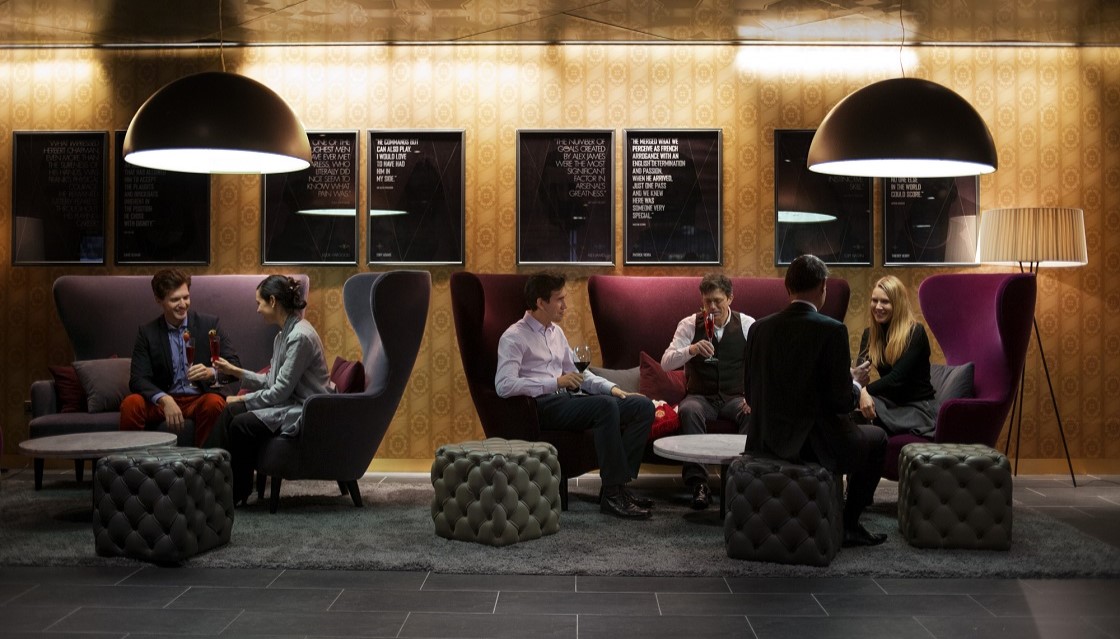What Is Corporate Hospitality?
Corporate hospitality is an exclusive practice that involves entertaining clients and guests in a professional setting to foster business relationships. Through this practice, companies aim to create a positive and memorable experience for their stakeholders to enhance brand reputation and gain a competitive edge.
In modern business environments, corporate hospitality has become an essential tool for showcasing a company’s values, culture, and capabilities, as well as establishing rapport with clients, suppliers, and other key individuals. Whether it involves hosting clients at high-profile events, conferences, or providing VIP treatment at sports matches, corporate hospitality helps companies create a platform for networking, deal-making, and strengthening partnerships.
This proactive approach to creating meaningful connections within the business world can result in increased trust, loyalty, and potential business opportunities. Effective corporate hospitality strategies require careful planning, attention to detail, and an understanding of the specific needs and preferences of the target audience.
Corporate Hospitality Defined
Corporate hospitality refers to the practice of a company or organization extending hospitality to its clients, partners, or employees to strengthen relationships, promote business growth, and enhance brand reputation. It involves hosting various corporate events, such as conferences, seminars, trade shows, product launches, or VIP experiences, that provide a platform for networking, entertainment, and business development.
Definition Of Corporate Hospitality
Corporate hospitality can be defined as the strategic practice of providing hospitality services and experiences to clients, business partners, or employees to foster stronger connections and promote business objectives. It involves organizing and hosting events or activities that offer a platform for networking, relationship-building, and showcasing the company’s products or services.
Companies often invest in corporate hospitality as it allows them to connect with clients and partners on a more personal level, creating a favorable environment for engaging conversations and strengthening business relationships. Such events provide the opportunity to showcase the company’s values, culture, and offerings, while also enhancing brand reputation.
Benefits Of Corporate Hospitality
Corporate hospitality offers numerous benefits for businesses. By organizing and participating in such events, companies can:
- Build Strong Relationships: Corporate hospitality events provide a conducive environment for developing and nurturing relationships with clients, partners, and employees. These events eliminate the formalities of the office setting and offer a relaxed atmosphere for meaningful interactions.
- Enhance Professional Image: Hosting corporate hospitality events showcases the company’s commitment to providing exceptional experiences to its stakeholders. It helps boost the company’s reputation and positions it as a reliable and trustworthy business partner.
- Promote Business Growth: These events offer opportunities for networking and business expansion. Through face-to-face interactions, companies can generate new leads, explore potential partnerships, and secure new business opportunities.
- Strengthen Employee Engagement: Corporate hospitality events are not limited to external stakeholders; they can also involve employees. Inclusive events create a sense of belonging and appreciation among the workforce, boosting employee morale and overall engagement.
- Generate Brand Awareness: Hosting or sponsoring high-profile corporate events allows businesses to increase their brand visibility and exposure. When attendees have a positive experience, they are likely to share it with others, amplifying the company’s brand awareness.
Overall, corporate hospitality provides businesses with a valuable platform to connect, engage, and grow. By investing in such events, companies can establish strong relationships, elevate their brand presence, and drive success in a highly competitive market.
Types Of Corporate Hospitality Events
When it comes to corporate hospitality, there are various types of events that businesses can organize to entertain clients, partners, and employees. These events provide an opportunity to build and strengthen relationships, create a positive brand image, and enhance business outcomes. Here are some popular types of corporate hospitality events:
Business Dinners
Business dinners are a classic choice for corporate hospitality events. They offer an informal yet professional setting, allowing participants to connect with each other in a relaxed environment. Companies often host business dinners in high-end restaurants or private dining venues, where guests can enjoy a delicious meal while engaging in meaningful conversations. These events provide an excellent platform for networking, discussing business opportunities, and fostering lasting relationships. Moreover, business dinners can be customized to suit specific needs, such as themed dinners or interactive cooking experiences.
Sports Games
Sports games are highly popular for corporate hospitality events. Companies often arrange tickets to premier sporting events, such as football matches, tennis tournaments, or golf championships. These events offer a dynamic and energetic atmosphere, providing an excellent opportunity for companies to entertain clients or reward employees. Attendees can enjoy live sports action, engage in friendly competition, and build connections over shared interests. Additionally, companies can enhance the experience by providing VIP seating, access to exclusive lounges, or arranging meet-and-greet sessions with professional athletes.
Conferences And Trade Shows
Conferences and trade shows present another avenue for corporate hospitality events. These industry-specific events gather professionals, experts, and potential clients under one roof. Companies can leverage these occasions by organizing networking events, exclusive receptions, or after-parties. This allows participants to connect with key industry players, exchange ideas, and explore potential collaborations. By hosting corporate hospitality events during conferences or trade shows, businesses can maximize their visibility, showcase their products or services, and make a positive impression on their target audience.
Importance Of Corporate Hospitality
Corporate hospitality plays a crucial role in nurturing business relationships and fostering brand loyalty. It involves hosting clients and partners in a welcoming environment, providing them with memorable experiences that leave a lasting impression. Through this practice, businesses can establish rapport, gain a competitive edge, and enhance their reputation.
Building And Strengthening Relationships
Corporate hospitality plays a crucial role in building and strengthening relationships with clients, customers, and partners. It offers a unique opportunity to connect with people on a deeper, more personal level. By hosting clients or partners at events, businesses can create a relaxed and enjoyable environment where genuine connections can be fostered. Building relationships in this way can lead to increased loyalty and trust, as well as long-term partnerships that are beneficial for both parties involved.
Enhancing Brand Image
Corporate hospitality is an effective way to enhance a brand’s image. When a business goes above and beyond to host events and provide exceptional experiences for its guests, it sends a powerful message about the brand’s values and commitment to excellence. By associating the brand with exclusive and memorable experiences, customers and partners are likely to view the business in a positive light. This positive perception can have a significant impact on the brand’s reputation and differentiate it from competitors in the market.
Increasing Business Opportunities
Corporate hospitality opens doors to new business opportunities that may not have been possible through traditional marketing and sales efforts alone. By hosting events and inviting key stakeholders, businesses can network and establish meaningful connections with individuals who can potentially contribute to their growth and success. These connections may lead to new partnerships, collaborations, referrals, and even direct business opportunities. In the competitive corporate world, nurturing relationships through corporate hospitality can give businesses a competitive edge and open doors to lucrative ventures.

Credit: baucemag.com
Planning A Successful Corporate Hospitality Event
Defining Event Objectives
Before you start planning your corporate hospitality event, it is essential to clearly define your objectives. What do you want to achieve through this event? Are you aiming to strengthen relationships with clients, boost employee morale, or showcase your brand’s values and capabilities? By understanding your objectives, you can tailor your event to meet those specific goals.
Choosing The Right Venue
When it comes to selecting a venue for your corporate hospitality event, it’s crucial to consider factors such as location, capacity, and ambiance. Does the venue align with your brand image and the experience you want to create for your guests? Is it easily accessible for attendees? Additionally, don’t forget to check if the venue provides all the necessary amenities and services to ensure a seamless experience for both you and your guests.
Creating An Engaging Program
To make your corporate hospitality event memorable and successful, you need to design an engaging program that keeps attendees entertained and captivated throughout. This could include a lineup of speakers, interactive sessions, networking opportunities, and entertainment that fits the theme and purpose of your event. Consider incorporating elements that generate excitement and offer value to your guests, leaving a lasting impression and fostering meaningful connections.
Managing Logistics And Budget
Properly managing logistics and budget is crucial to ensure the smooth execution of your corporate hospitality event. Start by creating a detailed timeline that includes all the necessary tasks leading up to the event day. This can include securing vendors, arranging transportation, managing registrations, and coordinating with the venue. Additionally, establish a realistic budget that covers all aspects of the event, including venue expenses, catering, entertainment, and any additional services required. Staying organized and proactive in managing logistics and budget will help you avoid any unnecessary stress or overspending.
Measuring The Success Of Corporate Hospitality
Corporate hospitality is a powerful tool that businesses use to build and strengthen relationships with clients, partners, and employees. But how do you measure the success of these hospitality initiatives? In this section, we will explore three key methods of measuring success in corporate hospitality: collecting feedback from guests, evaluating return on investment, and tracking business relationships.
Collecting Feedback From Guests
One of the most direct ways to measure the success of your corporate hospitality efforts is by collecting feedback from the guests who attended your events. By asking for their opinions and experiences, you can gain valuable insights into how well the event met their expectations and fulfilled its objectives.
You can collect feedback through surveys, interviews, or online reviews. Ensure that your questions are specific and focused on the key aspects of the event such as the overall satisfaction, the quality of services provided, and the effectiveness of the networking opportunities.
Example: – On a scale of 1 to 10, how would you rate your overall experience at the event? – Did the event meet your expectations in terms of networking opportunities? – What could have been done differently to improve your experience?
Evaluating Return On Investment
Another crucial aspect of measuring the success of corporate hospitality is evaluating the return on investment (ROI). This involves analyzing the costs incurred to host the event and comparing them to the tangible and intangible benefits gained.
To calculate your ROI, consider the monetary value of new business gained, the level of engagement and loyalty demonstrated by participants, and the overall impact on your company’s reputation. Use these metrics to determine whether the investment in corporate hospitality was worth it and helped achieve your business objectives.
Tracking Business Relationships
Corporate hospitality plays a significant role in fostering meaningful and long-lasting business relationships. To measure the success of these relationships, it is important to track and monitor interactions with key stakeholders before, during, and after the events.
Create a system to keep records of the connections made, partnerships formed, and collaborations initiated during the corporate hospitality activities. Regularly evaluate the strength and growth of these relationships to gauge the impact of your hospitality efforts.
Example: – Number of new business leads generated through the event – Number of business deals or partnerships formed as a result of the event – Increase in client retention rate after attending the event
By strategically collecting feedback from guests, evaluating return on investment, and tracking your business relationships, you can effectively measure the success of your corporate hospitality initiatives. These insights will help you refine your strategies, enhance future events, and continue to strengthen your business connections.

Credit: www.trophyevents.co.uk

Credit: hospitality.arsenal.com
Frequently Asked Questions For What Is Corporate Hospitality?
What Is Corporate Hospitality And Why Is It Important?
Corporate hospitality refers to the practice of entertaining and nurturing relationships with clients or employees, often through events and activities. It is important as it helps to build and strengthen professional relationships, enhance brand reputation, and create memorable experiences for attendees.
What Are The Common Types Of Corporate Hospitality Events?
Common types of corporate hospitality events include business lunches, golf outings, conferences, product launches, team building activities, and VIP experiences at sporting events or concerts.
How Can Corporate Hospitality Benefit A Company?
Corporate hospitality can benefit a company by providing opportunities to network and establish connections, showcasing products or services, enhancing brand visibility, fostering loyalty among clients and employees, and ultimately leading to increased business opportunities and growth.
Conclusion
Corporate hospitality is a valuable tool for businesses to foster relationships, enhance their brand image, and increase revenue. By creating memorable experiences for clients, employees, and partners, companies can distinguish themselves in a competitive market. This blog post has explored the concept of corporate hospitality, its benefits, and various forms it can take.
Whether it involves hosting events, providing VIP treatment, or organizing unique experiences, corporate hospitality offers a powerful way to connect with stakeholders and drive success.

